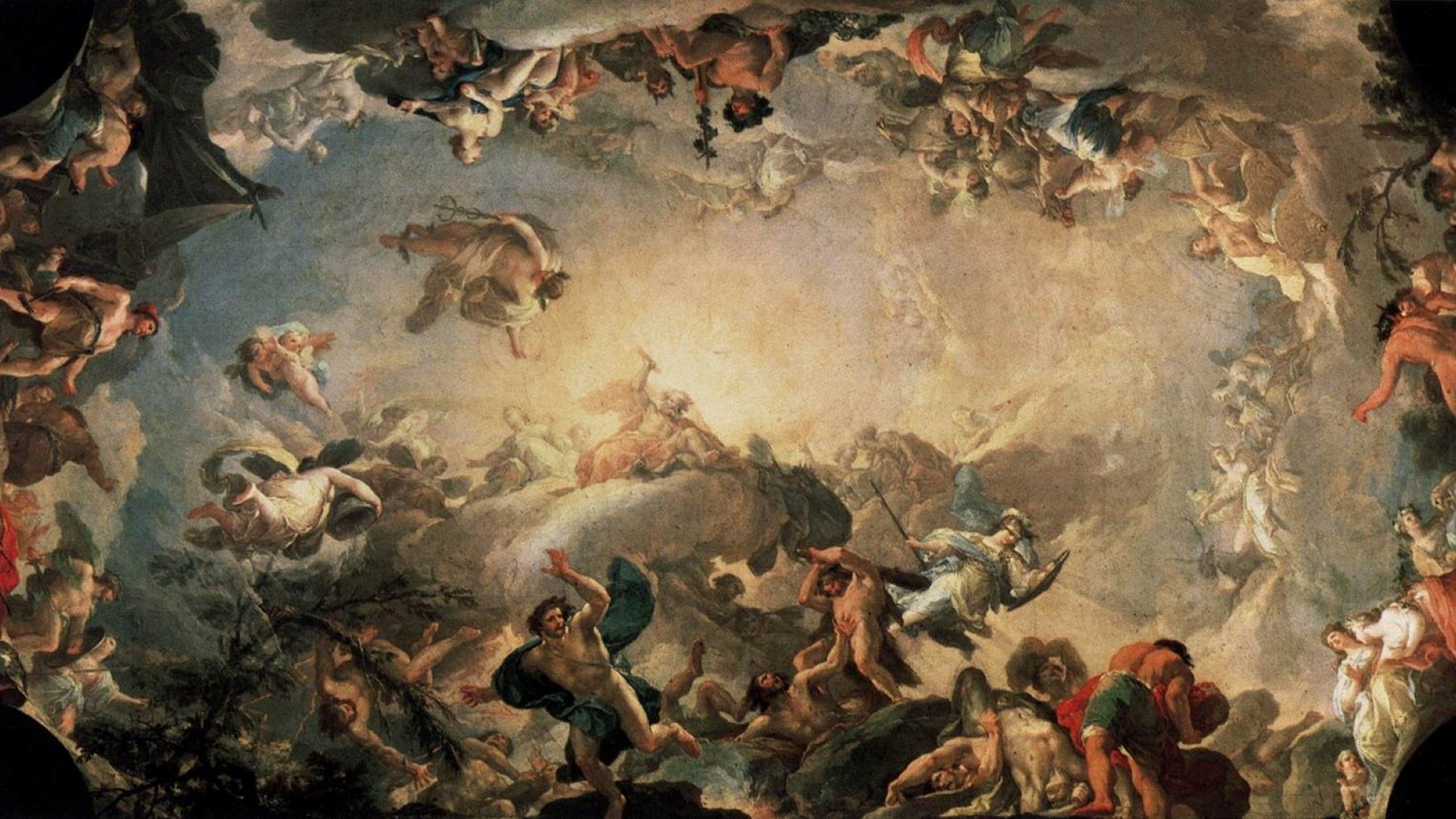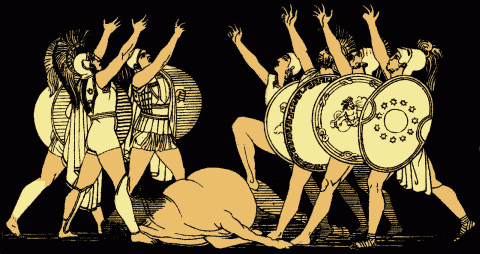
Seven Against Thebes

Aeschylus (Aiskhilos; c. 525/524 BC – c. 456/455 BC) was one of the three well-known tragedians; some refer to him as the father of tragedy. His presentation of tragedy is such that no other poet has matched. In his stories evil, through his eyes, takes on an unprecedented desolation and malevolence.
Seven Against Thebes is the third play of a trilogy named Oedipodea and takes place during a time before the Trojan War. The army of Thebes led by Eteocles confronts an Argive (Argos, in the Poloponese) army led by Polynices.
Oedipus was taken by his parents to Mount Cithaeron. Later he was found and adopted by Periboea, Queen of Corinth, and thus was raised not knowing who his true parents were.
The story of the Seven Against Thebes:
Oedipus, the king of Thebes, realizes that he has murdered his father and married his own mother and has had two sons and two daughters with her. Thus he is found guilty of murder and incest and his sons, who now despise him and are in desperate shame keep him isolated. In wild despondency, Oedipus blinds himself and curses his sons that they should have to divide the kingdom through bloodshed.
His two sons, Eteocles and Polynices, more rationally agree to both rule the land, Thebes, but in alternate years. Unfortunately, Eteocles who ruled the first year refused to step down and let his brother rule in turn. Polynices then realizes that he has no other choice but to fight for his rightful inheritance.
Taking with him a Theban treasure, the Robe and Necklace of Harmonia, he raises an army at the head of which, apart from himself, he places six of the bravest commanders of Argives, ready to attack Thebes. Those commanders were:
1-Polynices
2-Adrastus – king of Argos and brother of Eriphyle, wife of Ampiaraus.
3-Amphiaraus – also the king of Argos along with Adrastus, brother of his wife Eriphyle. He was clairvoyant, receiving this gift of vision from Zeus and was originally against this war but was forced into agreement.
4-Capaneus - was a warrior of enormous strength and body size. His arrogance was such that he defied even Zeus; during the siege of Thebes he claimed to all that Zeus himself could not stop him from occupying it.
5-Hippomedon - described as a large and powerful warrior.
6-Parthenopeus - fought in the battle bravely and died.
7-Tydeus – He was wounded in the war of the Seven outside the walls of Thebes. The goddess Athena had wanted to make him immortal. However, after he went into a rage and devoured the brains of the man he defeated (Melanippus), she had a change of heart.
It was not that easy to persuade the rulers and senate of Argos as to his cause. At that time Argos was split into three kingdoms: the kings were Adrastus, Amphiaraus, and Iphis. Amphiaraus was initially against this war. After all, he had the gift of foresight and could see only doom.
However, he was later forced to join the coalition as he was betrayed by his wife, who as bribed by those who campaigned in favor of the war. Upon leaving for the war, he took revenge on his wife by instructing his sons to murder their mother and wage war against Thebes when they were of age.
The play is mostly of rich dialogue which depicts the feelings of the people at the time; how the citizens reacted to the threat of the hostile army outside their walls, the feelings of Eteocles as well as the aspects of the character of a king who defies the well-being of the land before his own desires.
Aeschylus also gives a description of the seven commanders leading the Argive army and their attire; more specifically the devices on their respective shields. His key character on the side of Thebes, Eteocles places each Theban commander against an Argive attacker.
In the story, the seven Argive commanders separate to attack before each of Thebes’ seven gates. In 1891, though, archeologist Ulrich von Wilamowitz-Moellendorff affirmed that the seven gates were mentioned by Aeschylus for the sake of symmetry to the seven invaders of the city since seven such gates were not discovered in any excavations.
As it would be expected in such a tragedy, the two brothers, Eteocles and Polynices fight each other before the seventh gate. Although the attackers are in the end fended off, as was Amphiaraus’ vision, the two brothers kill each other in the end.
Aeschylus’ tragedy portrays the blind ego of men and the greed that may run in both sexes and illustrates the malice that is war. Fear, hate, despair, destitution, destruction and a victory that is unsung – all in one story that does not end there.
When the new king comes to power, Creon, he refuses to bury the dead enemies.
In ancient Greece the dead of either side had to be respected and buried as was the custom. Because Creon refuses, Antigone, Oedipus’ daughter, takes her brothers’ body, Polynices, and buries it secretly. When she is discovered, Creon orders to have her buried alive.
Ten years later, the sons of the Seven commanders (known as Epigoni) waged war against Thebes and were triumphant.
Ancient Greek tragedies as well as the teachings of many philosophers are quite contemporary today. Perhaps it would be wise to reflect on them and learn what it is that must be avoided or improved so that younger generations may inherit valuable teachings as well as a world worth living in.
“Wealth is most valued by men, and of all things in the world it has the greatest power. This I have come to secure at the head of my great army; for a man well-born but poor is worth nothing ...
The words of truth are naturally simple, and justice needs no subtle interpretations, for it has a fitness in itself; but the words of injustice, being sick in themselves, require clever treatment.” (Polynices. Euripides, Phoenician Women 440, 470).
“If all were at one in their ideas of honor and wisdom, there would be no strife to make men disagree; but, as it is, fairness and equality have no existence in this world beyond the name...
I will not yield the blessing of kingship to another rather than keep it for myself; for it is cowardly to lose the greater and to win the less.”(Eteocles 1. Euripides, Phoenician Women 500, 509).
[1]
Sources
Our Mobile Application
Check out Our Mobile Application "Ancient Greece Reloaded"


